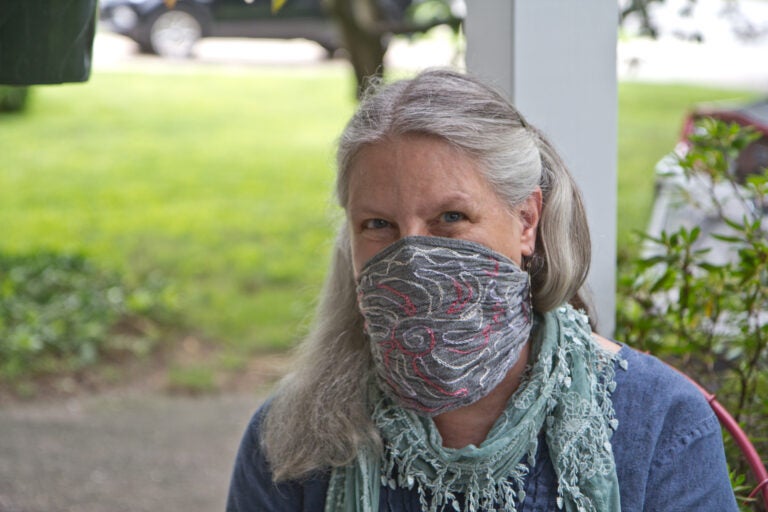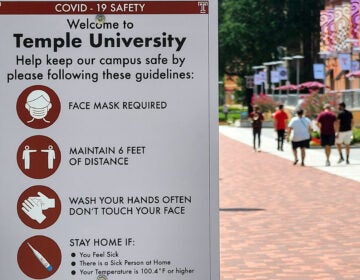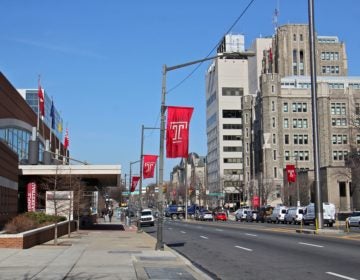Temple profs, students question pandemic plan after university suspends in-person classes
Temple professors, students and area residents are questioning why the university thought in-person learning would be safe after a spike in COVID-19 cases.

Deb Lemieur is a Temple professor who's been against in person classes since the pandemic began. (Kimberly Paynter/WHYY)
On Thursday, one of Temple assistant professor Naomi Taback’s students emailed her with disconcerting news: The student had been in close contact with people who had tested positive for COVID-19 and was now showing symptoms herself. She had been in Taback’s in-person class a few days earlier.
Taback wanted to warn the other students in her class they had been potentially exposed, but the university told her not to reach out to other students. The school also said in-person classes scheduled that day could go forward.
“We felt like the university was really pressuring us to continue in person, even though it didn’t seem safe,” Taback said.
A Temple spokesperson said that there was no reason to move classes online if a student had not tested positive, and that it was not the responsibility of faculty members to reach out to students who may have been exposed to coronavirus.
Temple adopted a more caution position over the weekend, announcing Sunday that it would suspend almost all in-person classes for two weeks. Only those deemed “essential” would be allowed to meet.
The university is currently reporting 103 COVID-19 cases, up from 58 cases on Friday.
“Since the very first reports of COVID-19 touched our lives, Temple has consistently held to one position: We will do the best we can to keep our community healthy and safe, while ensuring our students receive an excellent education and continue progress to graduation,” university president Richard M. Englert wrote in a letter to students, faculty and staff.
Englert urged Temple students to follow new guidelines from the Philadelphia Department of Public Health recommending that students avoid all social gatherings, regardless of size. The increase in coronavirus cases among Temple students was seemingly attributable to off-campus gatherings, Englert wrote.
Professors, students and neighborhood residents contacted by WHYY News applauded the move, but questioned why the university had thought it was safe to open for in-person classes in the first place.
“I think that the university knew in-class teaching was not going to be sustainable, but was very concerned about maintaining tuition, and especially getting the students to live in the dorms,” Taback said.
Adjunct professor Debi Lemieur condemned the university’s decision to suspend classes only after students and staff began testing positive.
“Why would they wait until people are already sick?” Lemieur said. “That, to me, is immoral.”
Some of the concern regarding Temple’s reopening has centered on how it could affect the health of those who live in the surrounding area.
Maxine has lived near the campus for decades. WHYY News agreed to withhold her last name. She said she’s seen students gathering without masks near her house in the last few weeks. The 68-year-old even buys masks to hand out to the students herself.
“They’re just partying. It’s a party atmosphere when they are living off-campus,” she said.
Maxine said she thinks suspending classes for a few weeks is a necessary precaution — a number of her neighbors are over 80, putting them at high risk for COVID-19-related complications. But she hopes that students are eventually able to return to campus.
“I think the campus experience is important,” Maxine said. ”I think it’s a good idea that [Temple] is being responsible.”
Multiple Temple students said the shutdown was unsurprising: The school joins a rapidly growing list of colleges and universities that have suspended or abandoned in-person classes because of coronavirus outbreaks. Many are skeptical of the university’s plan to restart those classes in two weeks.
“While we are happy that they are finally recognizing that there is a huge problem here … we still think what they are doing is problematic and they should shut down in full,” said Teresa Swartley, a senior majoring in political science.
Swartley is also a co-founder of the Temple University Coalition for a Change, a group of students, staff and alumni that has been pushing the school to move entirely online since before the school year began. She said the group will ramp up protests if the administration seeks to restart in-person classes.
Many students won’t be affected by the shutdown: 75% of Temple’s classes this semester were already being conducted entirely online, according to a university spokesperson.
Still, some students are disheartened to step out of the classroom and back behind their laptops again.
“It’s disappointing just because it’s not the full college experience,” said Elise Schmidt, a sophomore majoring in communication studies who had one in-person class. “And we are still paying the full tuition.”
Schmidt is skeptical that canceling classes will have an effect on coronavirus transmission occurring at off-campus parties, but she said the university was right to be cautious. By now, she said, she knows the drill: She’ll hunker down in her off-campus apartment with her phone out of sight and only Zoom open on her computer.
Schmidt said she is expecting to take classes entirely online for the rest of the semester, at least.
“I know I can handle it,” she said. “But it definitely would be a better experience in person.”
WHYY is your source for fact-based, in-depth journalism and information. As a nonprofit organization, we rely on financial support from readers like you. Please give today.



![CoronavirusPandemic_1024x512[1]](https://whyy.org/wp-content/uploads/2020/03/CoronavirusPandemic_1024x5121-300x150.jpg)



